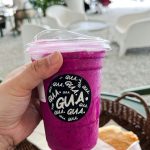A well-stocked fridge can be your best ally in achieving a lean diet. By transforming it into a smart nutrient tracker, you can effortlessly monitor your food intake and make healthier choices. Imagine being able to assess the nutritional value of what you consume with just a glance! This innovative approach not only simplifies meal planning but also empowers you to stay on track with your fitness goals. Explore how this technology can help you maintain a balanced diet and ultimately foster a healthier lifestyle.
Transforming Your Fridge into a Smart Nutrient Tracker
In today's fast-paced world, smart fridge technology is revolutionizing how we manage our diets. These fridges are equipped with advanced features such as nutrient tracking, which can significantly enhance your dietary management. By keeping track of the nutritional content of the items stored inside, smart fridges help ensure you are meeting your dietary goals.
Also to read : Transform Your Kitchen Air Quality: The Health Benefits of UV-C Air Purifiers in Reducing Harmful Contaminants
The integration of nutrient tracking into daily life offers numerous benefits. Not only does it provide a detailed analysis of your food intake, but it also assists in planning balanced meals. This technology is particularly beneficial for individuals with specific dietary needs or those aiming to improve their overall health. By receiving real-time updates and suggestions, users can make informed decisions about their eating habits.
To transform your traditional fridge into a smart nutrient tracker, several tools and apps are available. These applications can connect with your smart fridge, providing insights into the nutritional value of your groceries. Some popular options include apps that scan barcodes or use AI to recognize food items. By leveraging these technologies, you can effortlessly incorporate nutrient tracking into your daily routine, making healthy eating more accessible and manageable.
Also to see : Transform Your Kitchen: Discover How Strategic Acoustic Panel Placement Can Alleviate Stress and Curb Overeating
Practical Steps to Upgrade Your Fridge
Upgrading your fridge to incorporate smart technology can seem daunting, but with the right approach, it becomes an achievable DIY project. Here's how you can transform your traditional fridge into a smart nutrient tracker.
Assessing Your Current Fridge's Compatibility
Before embarking on a fridge upgrade, it's important to determine if your current model can support smart technology. Check for features like Wi-Fi connectivity or USB ports, which are often necessary for integrating smart devices. If your fridge lacks these, consider external solutions that can be attached or installed independently.
Essential Tools and Devices for the Upgrade
To successfully upgrade your fridge, gather essential tools and devices. You will need:
- A Wi-Fi module or smart plug to enable connectivity.
- Barcode scanners or cameras for nutrient tracking.
- A compatible app or software to manage and monitor data.
These tools are critical for transforming your fridge into a smart appliance capable of tracking nutritional information.
Step-by-Step Guide to Implementing Smart Features
- Install the Wi-Fi module or smart plug to enable connectivity.
- Attach barcode scanners or cameras inside the fridge to track food items.
- Download and set up a compatible app to sync with your fridge and manage data.
- Test the system to ensure all components are working seamlessly.
By following these steps, you can effectively upgrade your fridge, making it a valuable tool for dietary management.
Benefits of Tracking Nutrition
Tracking nutrition offers profound benefits, especially when it comes to enhancing nutritional awareness. By consistently monitoring what you consume, you gain a clearer understanding of your dietary habits. This awareness is crucial for making informed choices that support healthy eating.
Impact on Dietary Habits
When you track nutrition, it encourages you to be more mindful of your food intake. This mindfulness can lead to healthier dietary habits, such as choosing more nutrient-dense foods. It also helps in maintaining a lean diet, which is beneficial for weight management and overall health.
Psychological Benefits
Maintaining a lean diet through nutritional tracking can have significant psychological advantages. It often leads to increased self-control and satisfaction from achieving dietary goals. These positive feelings can boost motivation and adherence to a healthy lifestyle.
Long-term Health Advantages
The long-term health benefits of smart nutritional tracking are substantial. By consistently monitoring your diet, you can reduce the risk of chronic diseases such as diabetes and heart disease. It also supports maintaining a healthy weight and improving energy levels, contributing to a better quality of life. Embracing these practices ensures that nutritional awareness becomes an integral part of daily life.
Tips for Maintaining a Lean Diet
Adopting a lean diet involves strategic planning and making informed choices. With the help of smart technology, maintaining such a diet is more manageable than ever. Here are some effective strategies to support your journey towards healthy eating.
Meal Planning and Preparation Using Smart Technology
Meal planning is crucial for a lean diet, and smart technology can simplify this process. Utilize apps that offer personalized meal plans based on your nutrient needs. These tools can suggest recipes and grocery lists, ensuring you have the right ingredients for balanced meals. By preparing meals in advance, you can avoid unhealthy eating habits and stay on track.
Incorporating Nutrient Data into Daily Meal Choices
Leveraging nutrient data helps in making informed daily meal choices. Use smart fridges and apps to analyze the nutritional content of your food. This information guides you in selecting meals that align with your dietary goals. By understanding the nutritional value of your food, you can prioritize nutrient-dense options, supporting overall health.
Staying Motivated and Accountable Through Tracking
Tracking your progress is vital for staying motivated. Use apps to record your meals and monitor nutrient intake. Seeing your achievements can boost motivation and accountability, encouraging you to maintain a lean diet. Regular tracking allows you to adjust your meal plans as needed, ensuring continuous progress towards healthy eating goals.
Challenges of Smart Nutrient Tracking
Adopting smart nutrient tracking can present several challenges, but understanding these can help users overcome them effectively.
Potential Technical Challenges During the Upgrade
Integrating smart technology into your fridge may lead to technical hurdles. Issues such as connectivity problems or compatibility with existing appliances can arise. Ensuring that all devices are compatible and updating software regularly can mitigate these challenges.
User Resistance to Change and How to Overcome It
Resistance to change is a common barrier in adopting new technologies. Users may feel overwhelmed by the complexity of smart nutrient tracking systems. To overcome this, start with simple features and gradually explore more advanced options. Engaging tutorials or user-friendly interfaces can also ease the transition.
Solutions for Common Tracking Inaccuracies
Tracking inaccuracies can occur due to errors in food recognition or data input. To address these, regularly update the software and use reliable apps for precise tracking. Additionally, manually verifying entries can enhance accuracy.
By understanding and addressing these common challenges, users can improve their experience with smart nutrient tracking, making it a seamless part of their daily routine.
Real-Life Success Stories
Exploring case studies and user testimonials can offer valuable insights into the practical benefits of smart nutrient tracking. These real-life examples demonstrate how individuals have successfully transformed their diets and improved their health.
Interviews with Users Who Transformed Their Fridges
Users like Sarah, a busy professional, have shared their experiences of upgrading their fridges with smart technology. Sarah highlighted that the integration helped her manage her dietary needs efficiently, saving time and effort. She noted that the nutrient tracking feature was particularly useful in planning balanced meals, which led to better health outcomes.
Case Studies Highlighting Successful Dietary Changes
In a detailed case study, a family of four transitioned to a healthier diet by using smart fridges. The family's dietary habits improved significantly, with an increase in nutrient-dense food consumption. This change was facilitated by the fridge's ability to provide real-time nutritional data, enabling informed food choices.
Lessons Learned from User Experiences and Adjustments
From these experiences, users learned the importance of patience and adaptability. Adjusting to new technology required time, but the benefits were substantial. The key takeaway is that gradual implementation and consistent use of smart features can lead to sustained dietary success.










